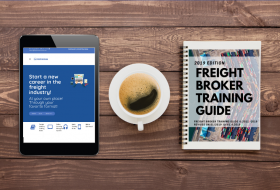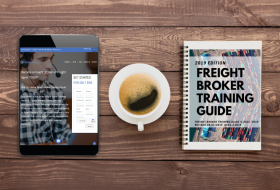- Get To Know A Broker
Welcome to our new series “Get To Know A Broker”! We are lucky to have Chris share his story with us on his experience of becoming and being a broker! He give a lot of insightful advice from his career and we are lucky to have gotten such a great example of a successful broker on our first interview!
- Please share your story with us. How did you get to where you are today?
“I was newly unemployed and in an off-the-cuff, spontaneous moment, I cold-called for an entry-level listing for a nearby freight brokerage. I had absolutely no idea what I was getting into, but decided to jump into it with both feet and give it everything I had.
I interviewed with three people and every single one of them told me that the choice to get into this line of work had changed their lives for the better. I’m years beyond that interview now, but I think about it every single day. I was in healthcare before – couldn’t possibly be any more demanding than that, right?”
- Great, so let’s dig a little deeper into the story – has it been an easy path overall and if not, what were the challenges you’ve had to overcome?
“It wasn’t easy for me. Historically, I’ve always found myself learning life lessons the hard way and I’m not sure I could say that I had a solid work ethic before, but whatever path it was that I was on, it wasn’t working. The hardest part, in my experience, was adjusting my attitude to make sure that I was doing the best I could by MY standards. Sometimes it meant doing the busy-work of others and it certainly meant stepping outside my comfort zone in order to be more productive than my pay grade.
There was an awful lot of ‘fake it ’til you make it’. I had to overcome a fear of phone calls – I didn’t know the business and I didn’t know the lingo. That made it absolutely uncomfortable when it was my turn to be the voice on the other end of the line. Hell, I didn’t know anything and for the first few months it definitely showed; it wasn’t uncommon for me to make an fool of myself.
Thankfully, humiliating myself once or twice kept me from making those same mistakes/assumptions again and it was because of those experiences that I became better suited for the industry. Be it big or small, you will not know how to handle success until you know how to handle failure. After a few years, I figured out that this applies to much more than just brokering freight.”
- Alright – so let’s talk business. Tell us about your Brokerage – what should we know?
“I now work for a family-owned brokerage that boasts nearly 40 years of business across North America. My boss, the owner of the company, has expressed on more than one occasion that while profits are important for the growth and sustainability of a company, the pride of his businesses is in the people under his employ and the moral fiber under which they operate.
An honest living is hard work and this is not always an easy business, but I am privileged to work alongside some of the smartest, most driven, honest and hardworking brokers, drivers, dispatchers, and administrative staff that the industry has to offer. I simply cannot imagine being anywhere else.
There are a lot of issues plaguing this business, many of them stem from the tensions between brokers, carriers, and their distrust of one another. I do my best in my capacity to be an instrument of change – to ease those tensions by assuring the most skeptical among us that our top priority is always An Honest Day’s Work. “
- Where did you get your training? What did you like and dislike about it?
“Looking back on it, my training was hardly training at all and sometimes I think I did better because of it. I tried to keep notes but gave up after three days because the pacing of the to-do lists and constant flow and change of information made it impossible.
I was thrown to the wolves, so to speak. Sink or swim. I either had to find a way to fit my lifestyle and working habits to the new job or I had to discard them entirely. Thankfully, I had adjusted my attitude. A new job in a new industry meant new habits and new responsibilities.
I took every phone call. I made sure to take point on problem loads, from pickup to delivery. If I didn’t know the answer, I asked the question. I made myself available to help with issues that were above my paygrade and insisted on being copied into as many of the daily emails as I could. I took stacks of paperwork home every night and did dozens of check calls before bed – then I was early to the office the next day so I would be an hour ahead of any issues that developed in the meantime.
Admittedly, I did these things not only because I wanted to succeed, but because I desperately didn’t want to get chewed out. Every time I made a mistake, I heard about it … so did the people next door. That’s a powerful motivator and honestly, it did the trick.”
- Is there a characteristic or quality that you feel is essential to success in the Logistics industry?
“You can’t take anything personally. Thick skin is a must. It’s never okay to lash out at anyone, but this is a time-sensitive business and there will be days when tensions run high. I owned my failures and didn’t make excuses for them, but made sure to be first in line to sort out and square away whatever it is that went wrong.
You also have to give it your best. If you aren’t dedicated to the quality of your work and the satisfaction of your customers and associates, this isn’t the business for you because it WILL catch up with you.
- Any advice you would like to give to other people wanting to get into the logistics industry?!
“If you aren’t willing to give this business everything you’ve got, it will never return the favor.
To brokers specifically – never, ever forget that your job cannot be done without the drivers. It’s okay to be apprehensive of them, but their time is worth something and we can all do just a little bit better if it means doing right by them. You aren’t selling your soul by placing your carrier satisfaction on par with that of your customer.
Most of them just want to do an honest day’s work too.”
The ounce-of-prevention adage has never been more true than it is in Logistics. When something goes wrong late in the day, it’s your preparation habits that determine how effective the solution may be.”








